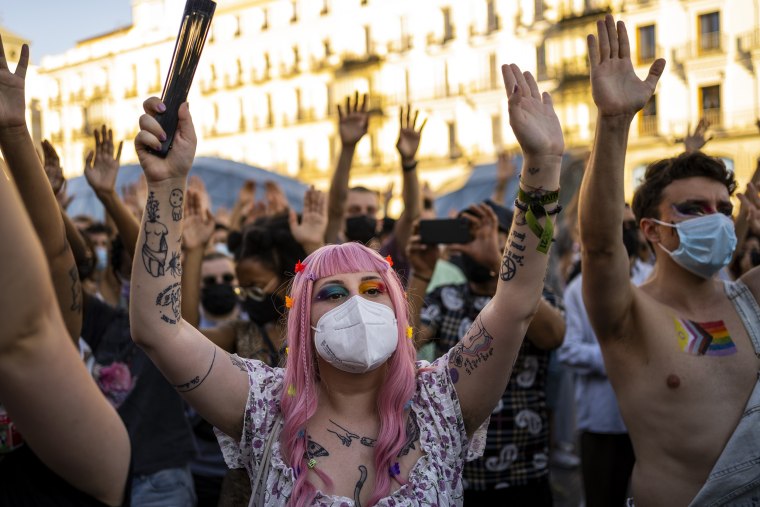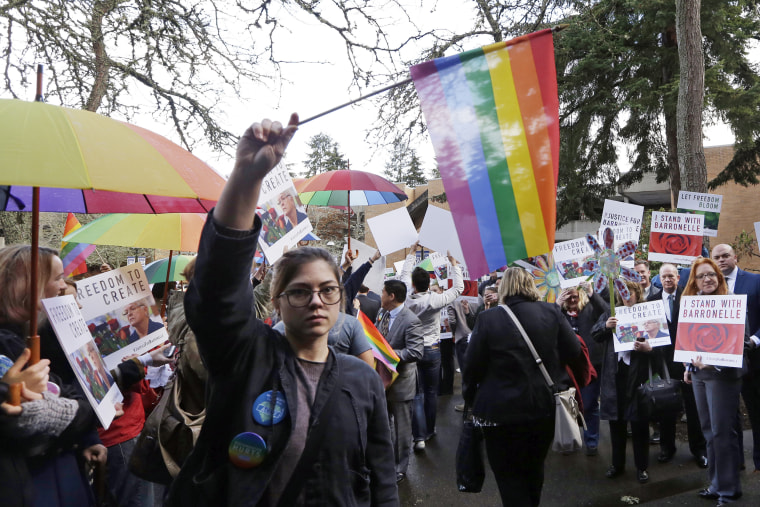“No Straight Lines: The Rise of Queer comics,” tells the story of five scrappy and pioneering cartoonists who depicted everything from the AIDS crisis, coming out, and same-sex marriage, to themes of race, gender, and disability. They tackled the humor in queer lives in a changing world, and the everyday pursuits of love, sex, and community. Their work is funny, smart, and profound, and provides a unique, uncensored window into LGBTQ lives from the 1970s onward, beginning at a time in which there was no other genuine queer storytelling in popular culture. Equally engaging are their personal journeys, as they, against all odds, helped build a queer comics underground that has been able to grow and evolve in remarkable ways
The Film’s director/producer Vivian Kleiman is a Peabody Award-winning documentary filmmaker.[1] She has received a National Emmy Award nomination for Outstanding Individual Achievement in Research and executive produced an Academy Award nominated documentary. Her films include: “Families Are Forever” “Always My Son” “Out for the Count.”
In 2019, Kleiman was awarded a Eureka Fellowship of the Fleishhacker Foundation, a fellowship program for visual artists. Also an educator, she served as Adjunct Faculty at Stanford University‘s Graduate Program in Documentary Film and Video Production from 1995–2004.
Kleiman was a long-time collaborator with black gay filmmaker Marlon Riggs. They founded Signifyin’ Works in 1991, which creates and distributes films about the experiences of African Americans. Directed by Riggs, their 1992 film “Color Adjustment” screened at the Sundance Film Festival and received the International Documentary Association‘s IDA Award, the Erik Barnouw Award from the Organization of American Historiansand the George Foster Peabody Award in 1993
“No Straight Lines: The Rise of Queer comics,” which will be screened as part of Outwatch’s Film Series Thursday, July 15th at Rialto Cinemas in Sebastopol.
Gary Carnivele: Have you always been a fan of Queer Comics and which were some of the first that you followed?
Vivian Klienman: I was a huge fan of Alison Bechdel’s Dykes To Watch Out For when it was serialized in the local women’s newspaper, Plexus. We all would chomp at the bit in anticipation of the next installment, and learn what exploits our fave characters got into. And of course, Hothead Paisan was a hoot.
GC: Did they play a part in opening up a new, big, queer world to you?
VK: Dykes to Watch Out For was so important for many of us – it was the first time many of us lesbians in the 80s actually got to see ourselves represented in comics. Goodbye to the hokey white bread romances. Goodbye funny little animal stories. Instead, it was poking fun at our real lives with elegance and insight. That was such a gift to lesbians as we were creating new networks of connection (eg bookstores, cafés, and community health care providers.)
GC: What made you decide to make “No Straight Lines” and what were your first steps to get others interested in joining you on this cinematic journey?
VK: I was approached by a colleague Greg Sirota and his friend Justin Hall (an expert in the subject) to take on the project. Justin encouraged me to attend the first Queers & Comics Conference (an international in-gathering of a wide diversity of artists) held in NYC in May 2015. It was a casting director’s dream. When I walked in and saw a young person with chartreuse-colored hair talking with an older gentleman with balding head wearing a buttoned-down collared shirt, surrounded by a panoply of gender non-binary non-conforrming (to ANY standards and assumptions), I was drawn in. And once I attended the panels over the next 3 days, and heard the remarkable stories and saw the range of artwork, I knew it would be my next film project.
GC: I can imagine you and your team did a huge amount of research. What was that process like?
GC::Did you and your team straight away know who you wanted to be in the film?
VK: I knew that I did not want to do a film that replicated Justin’s anthology of queer comics, which would be an encyclopedic history of who did what when.
Instead, I wanted to create a film that took the viewer on an experience that touched many different emotional notes: from the humorous, to the poignant, and the painful moments.
So, I limited the film to profile 5 pioneer queer cartoonists and that was a challenge: who to omit when there are so many talented and important artists to profile. Justin and I carefully deliberated that decision.
GC: How receptive were the subjects of your film to tell their stories on camera?
VK: All of the comic book artists who I met are eager to tell their stories. While they are content to have solitude and do creative work, contrary to the stereotype of a curmudgeonly artist, these folks are genuinely eager to share their work.
GC: What surprised you the most about them, their work, and their careers?
VK: I never expected this band of mischievous artists to be appealing to such a broad audience. I think it boils down to this: a well-made film about people who follow their passion. Instead of the drive to earn money, these artists are motivated to be creative in a world where there isn’t much likelihood of financial remuneration. Their passion for their work is infectious.
GC: Who are some of the artists that you weren’t aware of and what do they bring to the medium?
VK: The new generation of web artists were all new to me. I love the fact that the Internet and tech can continue to be a place where the DIY artform continues to flourish.
GC: You do a terrific job representing the doc’s subjects creative process in the film. What did you find most interesting about the development of their work?
VK: One of the important themes that I braided in the film is that of “the means of production,” as Karl Marx would say. I really enjoy taking the viewer on this historical journey not only of queer history in the U.S., but of the evolution of the art form itself. The journey starts from a pen and paper, then expands to offset printing, to Xerox machines, to major printing processes, and finally the web.
At the same time, the nature of the images evolved. After Rupert realized that he had been drawing only white people, he trained his eyes on his own experience as a Black gay man. Diane diMassa gave voice to the rage of inequality and violence against women. At the height of the AIDS epidemic, queer artists responded with comics that ranged from the tragic to the humorous.
GC: Did you have a real sense of what the film would look like or did that come about during editing?
VK: During the editing, I realized that the film felt stale. I wanted to infuse it with a vitality and with a connection to my targeted audience: queer youth. So I did an experiment: I spent a day filming “speed interviews” with a dozen Next Gen artists who were attending the 2017 Queers & Comics conference. I had exactly 10 minutes with each artist, enough time to say hello and ask them just a few basic questions. At the end of the day, I didn’t know how I was going to use that material, but I knew I had something special. Those became the “Greek Chorus” in the film, and immensely changed the tone and impact of the film.
GC: Even though the focus of the film is Queer Comics, you truly take us on a trip through LGBTQ+ history. Why was it important for you to firmly set the work on the background of the Queer experience?
VK: You know, despite the many successes in the journey towards acceptance of queers in this country and others, the statistics about attempted suicide among queer youth is by far disproportionate to the general population. This is deplorable. And our youth still need our help towards self-acceptance.
I wanted to create a film that I wish I had when I was young and struggling with coming out. And I wanted to offer young queers today who similarly are struggling with their identity, to understand that there were many who encountered similar obstacles along the way. The history of queer comics is a wonderful journey from isolation to the formation of community that I hope will inspire a new generation.
GC: You premiered the film at Tribeca and it was featured at Frameline. At what other festivals was it screened and what was the virtual film festival experience like for you?
VK: It’s an independent filmmaker’s dream to premiere at Tribeca. But No Straight Lines continued further, and reached the perfect trifecta of major venues for its launch: Tribeca, Sheffield Doc Fest (England), and American Film Institute Doc Fest in DC – this is such a joy! It’s also a testament to the amazing team of collaborators who together helped me shape a film that aimed for more than information and journalism. We all were dedicated to the art and craft of storytelling. And that infused the work with a vitality that touches a much larger audience than I set out to reach.
GC: When you were finally able to experience a live audience’s reaction, what aspects of the doc did they seem to connect to the most?
VK: I love how everyone erupts in a deep guffaw when seeing two older gay men, who have lived together and loved one another for over 40 years, sit down in front of the tv to watch the morning news with eggs and coffee on the tray. So ordinary and so unremarkably the daily experience of so many.
GC: What are you working on now?
VK: I often serve as an Executive Producer on documentary films, especially ones with a challenging subject and filmic approach. Currently, a film by Vicky Funari is in post-production. It’s a profile of a group of seniors who take an aquacize class at their neighborhood YMCA swimming pool – older bodies and souls in water.
In the Fall 2019, I was honored with a Eureka Fellowship from the Fleishhacker Foundation that I planned to start this winter. However, with the arrival of Covid-19, and the incredible loss of over 600,000 American lives, I am probably going to change the focus of that film. Stay tuned!







 Our great supporters, Bob and Rick enjoying the 2019 picnic.
Our great supporters, Bob and Rick enjoying the 2019 picnic.

